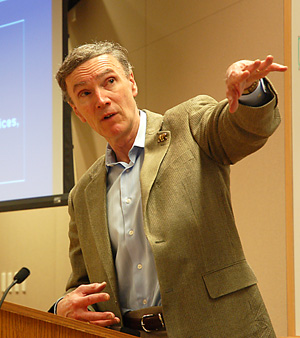Experts weigh in on the battle for national healthcare reform
Cost containment and overhaul of care delivery must accompany expanded access, insists public-health dean
| 6 April 2009
BERKELEY — As the struggle over national healthcare reform unfolds in Congress, a panel of experts, at an April 1 campus forum, explored "considerations for the Obama administration" in the herculean and unpredictable political battle ahead. Four experts in health policy, politics, law, and labor focused on needed changes, with emphasis on what is realistically achievable given the political forces at play, or what one speaker called "parameters of the possible."
 Dean
of Public Health Stephen Shortell (Jeffery
Kahn photo)
Dean
of Public Health Stephen Shortell (Jeffery
Kahn photo)"How can you get to 60 votes in the Senate?'" asked UCB Labor Center Chair Ken Jacobs, a veteran of past attempts to achieve healthcare reform — in San Francisco (which succeeded), and for the state of California (which failed). "The fight for a meaningful public plan is going to be major."
According to Washington veteran Ann O'Leary, executive director of the Berkeley Center on Health, Economic, & Family Security (CHEFS), both the Obama administration and Congress have learned a great deal from the last major effort to assure universal health care for the American public, in the early 1990s. One valuable lesson is that "timing is absolutely critical," O'Leary said, noting that major reforms, historically, have been most achievable during the first year of a U.S. presidency. For healthcare-reform advocates, "it's critical to get this done now," she said. "This is moving fast and furious" on Capitol Hill.
O'Leary, who served as a White House adviser during the Clinton administration and as legislative director to Hillary Clinton early in her Senatorial career, predicted that the legislation will "move incredibly fast" if its sponsors opt to move it forward via the congressional budget process, or "a little bit slower, but with a commitment to try to get it done this year," if moved through the normal legislative process.
The ultimate defeat of the Clinton administration's healthcare reform also made clear that "it cannot be the Obama administration locked in a room figuring out all the knotty problems of health reform" and delivering the bill to legislators, O'Leary said. "There needs to be serious buy-in from Congress."
The Obama White House, accordingly, is offering "technical assistance and support" on healthcare reform, while making it clear that the legislation is Congress's to craft. It's also encouraging, O'Leary noted, that the five House and Senate committee chairs who have jurisdiction on healthcare have agreed to basic principles for a reform package: access to affordable healthcare for virtually all Americans, and requiring employers to either provide private health insurance coverage or pay into a competing, government-run healthcare plan.
| Writings on healthcare reform |
"Yes
We Can? The New Push for American health Security" "The
Case for Public Plan Choice in National Health
Reform" "No
Recovery in Sight" |
Currently, more than 45 million Americans are medically uninsured. Under a public-private hybrid plan — sometimes called "public plan choice" — now being contemplated, those who are medically uninsured, whether employed or unemployed, go into a pool referred to as "the exchange," where they can choose between a government-managed health plan and a variety of regulated private insurance plans, explained CHEFS Associate Director Melissa Rogers. The public option, she said, could offer administrative efficiencies (such as lower advertising costs), cost savings through negotiated rates, and transparency and accountability. (It is currently "very difficult, if not impossible," she noted, to obtain information on private insurers' payment rates to hospitals and on patient outcomes; a government-managed program could make that essential data available, and use that information to help contain healthcare costs.)
Public polling suggests broad public support for letting Americans choose between private health insurance and a government-run program, Rogers said. She cited a January survey of likely voters nationwide, showing that 73 out of 100 favor public plan choice. (That total includes support from 63 percent of Republicans, 77 percent of Democrats, and 79 percent of Independents.)
But healthcare reform plan will be sustainable only if expanded access is coupled with an overhaul of healthcare delivery, argued Stephen Shortell, dean of Berkeley's School of Public Health. He noted huge variation, by U.S. region, on rates of hospitalization, lengths of hospital stays, number of physician visits, and costs to treat a given medical condition. What is driving these healthcare decisions? Not what works best at getting and keeping patients well, he said, but other considerations, like the number of physicians per capita in a given region and the availability of high-tech treatments.
An adviser to the Obama administration on the current reform effort, Shortell called for sweeping changes in healthcare delivery — involving, for example, robust analysis of outcomes data, changes in how healthcare providers are paid, IT investment (including technical support, not just hardware and software), and renewed emphasis on primary-care medicine.
"We need a coherent package or portfolio of policies and tools that are fundamentally going to change how we deliver healthcare in the United States," insisted Shortell. Without "policies that reinforce each other like a puzzle," the U.S. healthcare system will remain essentially broken, he predicted.

